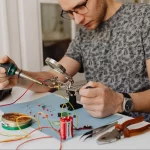How Do I Become a Better Problem Solver?
From checking different perspectives to shifting a problem into a question, here are 11 answers to the question, “What are some excellent strategies you use to become a better problem solver?”
- Gather Perspectives
- Analyze the Consequences of Postponing Quick Fixes
- Visualize the Solution to Your Problem and Find the Tool
- Practice
- Learn from the Mistakes of Others
- Develop a Critical Mindset
- Avoid Always Depending on One Solution
- Expand Your Perspective
- Continuously Challenge Yourself to Improve
- Try Compartmentalization
- Flip Problems into Questions
Gather Perspectives
Ask for the opinions of others. Sometimes, our one singular perspective is missing something that we need to solve the problem.
By asking for the opinions of other people, you’re opening your mind up to new perspectives and different points of view. Somewhere in another point of view may lie the solution to your problem. Simply put, you can always benefit from the advice and insight from the people around you.
 John Berry
John Berry
CEO and Managing Partner, Berry Law
Analyze the Consequences of Postponing Quick Fixes
To become a more effective problem solver, or even to be one, you must weigh the pros and cons of piling up problems in your life. When you realize that the sooner you solve it, the better everything gets, you start to be in a hurry to solve it and think more carefully about how to do it more efficiently.
Be practical, take a deep breath, and do the best you can as quickly as possible. Problems will always be there. It’s up to you to feed or eliminate them, remembering that their space will always take the place of better things.
 Thaina Geniselli
Thaina Geniselli
Country Manager, Financer.com
Visualize the Solution to Your Problem and Find the Tool
Have you ever painstakingly looked for something that was right in front of your face the whole time? One big reason you overlooked it is that you weren’t visualizing it properly.
Visualization is such a powerful yet underutilized skill. Close your eyes, take slow and even breaths, and imagine the solution to your problem in full color and in as much detail as you possibly can. Imagine, for example, a tech solution: you have two near-identical spreadsheets and you want to find all the differences between the two datasets.
Chances are, if you can imagine it, it’s possible. Next, you’ll find the tool or person who can help you with your issue. The benefit of the visualization exercise is that you will be able to more clearly communicate to that person what you imagine to be possible. And if you can get that person to imagine the same thing, you now have two brilliant minds dead-set on the answer.
 Candice Trebus
Candice Trebus
Marketing Manager, Social Media and Email, Woodruff Sawyer
Practice
The best way to become a better problem solver is to practice. Take time each day or each week to devote yourself to solving puzzles and problems that challenge you.
This could be crosswords, Sudoku, online quizzes, etc., but any activity that requires problem-solving skills can help hone your ability. Additionally, if available, seek out additional resources such as online classes or tutorials to give you extra practice in problem-solving. The more you practice, the better your skills will become.
 Martin Seeley
Martin Seeley
CEO, Mattress Next Day
Learn from the Mistakes of Others
When you develop the habit of learning from others, you notice many things that help you latch onto tried and tested growth and success paths. And since every successful journey includes a unique ability and strength to overcome problems, these problem-solving insights constitute a significant part of your learning.
In scrutinizing the problem-solving skills of others before me in the industry, seniors in my inner circle, existing professionals in my field, and even my competitors, I’ve been able to gain insights that not only help me with my business problems but also show me how to steer clear of them. More importantly, it has shown me which solutions work best and which fail, saving me loads of time and effort.
 Neil Platt
Neil Platt
Director, Emerald Home Improvements
Develop a Critical Mindset
Want to become a better problem solver? Develop a critical mindset. Use your ability to reason, and be an active listener rather than a passive recipient of information. It is also crucial to consider different perspectives and points of view. Open-mindedness of that kind will help you approach the given problem holistically.
Think about the entire picture and examine its various aspects. Last but not least, in the modern, fast-paced world, everything is teeming with data and people are overwhelmed with information.
Thanks to a critical mindset, you will find it easier to distinguish between relevant and irrelevant issues. Spot patterns, make judgments, ask questions, and draw conclusions. And solve the problem.
 Agata Szczepanek
Agata Szczepanek
Community Manager, LiveCareer
Avoid Always Depending on One Solution
I try to find several solutions that can work when handling a problem. This gives room for alternatives if one solution cannot work out.
To come up with several solutions to a problem, I talk to people who may have faced and dealt with the same or similar problem, and I also look at the problem from other perspectives. I ensure I create corresponding goals to help measure the success of each solution.
 Nirav Patel
Nirav Patel
Growth Leader, GrowthWisely
Expand Your Perspective
To improve my problem-solving, I like to apply the quote by US General Eisenhower:
“Whenever I run into a problem I can’t solve, I always make it bigger. I can never solve it by trying to make it smaller, but if I make it big enough, I can begin to see the outlines of a solution.”
This quote captures the powerful concept of Systems Thinking, to which I like to add insatiable curiosity and a healthy dose of humility in accepting that we probably don’t fully understand the problem. Building on systems thinking, I recommend investigating the problem from the perspectives of the physical, logical, and personal. That is, how does the problem work in context with the system, and who is involved?
Add in that curiosity and learn to ask from a diversity of viewpoints to ensure a holistic understanding. Systems thinking, with curiosity, humility, and perspective, is an essential enabler for you to improve in solving problems from simple to complex and across multiple domains and disciplines.
 Michael Woudenberg
Michael Woudenberg
Chief Innovation Officer, Polymathic Disciplines
Continuously Challenge Yourself to Improve
The way I became a better problem solver is through a mindset of continuous challenge and improvement. I sought new and difficult problems, for example, by taking on additional responsibilities at work, volunteering for new projects or tasks, or actively seeking out new learning opportunities.
I then used my learnings and the knowledge, advice, and perspectives of others, and took the time to reflect on past problem-solving experiences to identify what worked well and what could be improved.
Over time, this practice and experience helped me develop critical thinking, creativity, and the ability to think outside of the box, which are all-important skills for effective problem-solving.
 Will Baker
Will Baker
Founder, Skirtings R Us
Try Compartmentalization
One way I have improved my problem-solving skills is through compartmentalization. That means breaking problems down into smaller parts since complex problems, when viewed as a whole, can be overwhelming and can lead to frustration, a feeling of being lost, and cluelessness.
By breaking your problem down into smaller, manageable chunks, I have been able to prioritize which part matters most at the moment, figure out how to solve it, and use that to work on other chunks of the problem. I hope that helps!
 Ralitsa Dodova
Ralitsa Dodova
Content Writer, BuzzLogic
Flip Problems into Questions
When a problem is too difficult to solve or navigate, reframing it into a question may help you switch your focus from the problem itself to the solution.
Instead of saying “the problem is,” you can turn it into a question such as “How can we?” or “What do we do with…?” For example, your business may struggle to sell a certain product. You can reframe the problem, “We need to find a way to sell our product” to “How can we get customers to buy our product?” in order to switch the focus from the problem to solving it by helping and understanding your customers.
From here, you can also take your questions a step further to help you come to a strong solution.
 Joe Acosta
Joe Acosta
Digital Marketing Manager, BBQ Galore
Submit Your Answer
Would you like to submit an alternate answer to the question, “What’s one way you became a better problem solver?”






